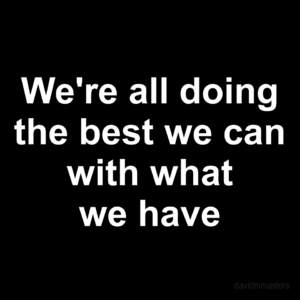Everyone remembers the Golden Rule, “Do unto others as you would have them do unto you” (Matthew 7:12) but I would like to see it upgraded to the Diamond Rule rewritten to say, “Allow unto others as you would have them allow unto you.”
That is to say that you allow everyone else the same respect and courtesy that you would like to receive from them. Not to hard to imagine how this diamond rule could be a huge improvement on the simply doing of things, which is great, but to simply allow someone to be, as you would like to be allowed to be, is a far superior concept.
The precepts for the diamond rule are that all of us are equal, we are all in the process of being, we are all in different stages of growth and change, no one is better than anyone else, we are all individual, yet one and the same.
Some of the ways we can prepare our mindsets to appreciate others in this way would be to honor our differences. Realizing that we are all uniquely different, seeing and celebrating our differences instead of putting others down for being different.
Not being afraid about getting to know someone who is different and might have potentially hugely differing points of views on things, may have an accent, might look and act different, maybe even have a sense of wonder about what it might to be like that person.
You might be able to develop a genuine curiosity about other people, how they go here, their history, heritage, and details about the place that they came from. No need to be timid shy about asking someone about their lives if its non-threatening and tempered with compassion, sharing, and caring.
If something someone says generates a negative feeling inside you, do not lash out at the person who is sharing. Instead, think about looking inside of yourself and ask yourself why you might have responded in that manner to his or her words?
There’s a good chance that you have some hidden (or maybe not so hidden) negative programming at work which might have made you feel that way. Might be an indicator that some deep inner work is necessary for you to continue your own growth and evolution.
As you get to know someone else’s world, continue to grow in your own sense of self, and what you believe. The more self-confident and secure you are in yourself you are, the less defensive you will have to be. If you are very secure about you, there is no need to be threatened by a differing viewpoint, and you can honor someone else’s point of view, like you would want them to honor yours.
Don’t be afraid about using your imagination to put yourself in someone else’s shoes. What might it be like for that person, having lived the life they lived until now? Even in the most difficult circumstances, if someone is disrespectful or expresses anger, instead of posting up to fight back, why not try to understand why he or she might be responding that way?
Chances are, if you’d lived that person’s life, step by step, having endured everything in life that led up to that point, you would have reacted the same way.
When someone’s reaction surprises you or seems to be out of character, you may become curious and wonder why? They might even want to talk about it if you’re non-threatening and genuinely concerned and can have this conversation compassionately without pride or judgment.
Just remember that deep down, we’re all the same. In fact, just to put your mind at ease, even with all our differences, we are 98.2% exactly the same.
So, maybe – just maybe – the next time you think about judging someone or feeling different, you might think about my diamond rule and, “Allow unto others as you would have them allow unto you.”
It doesn’t seem like too much to ask, allowing someone else the same respect and courtesy that you would like to be treated with.
What an excellent way to be different, by allowing others to be different, too, while feeling safe and secure in the knowledge that we are all in this together.
And if you are very brave, you can let the diamond rule flow over into all areas of life where you feel separation or negative feelings about other people, places, or things.


